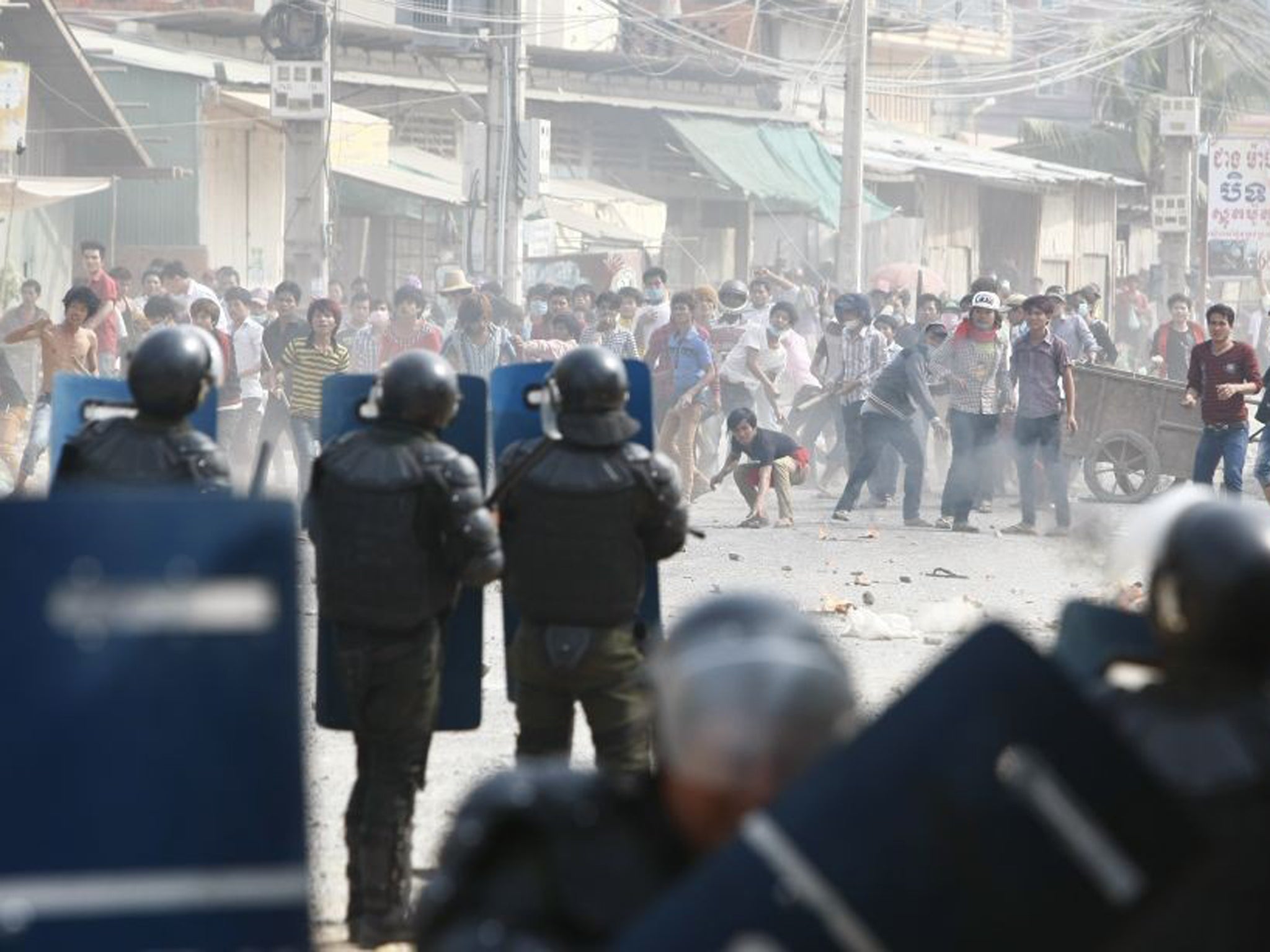At least three dead after police open fire on striking workers in Cambodia
Police fired AK-47 rifles after protesters blocked a road and began burning tires and throwing objects

Your support helps us to tell the story
From reproductive rights to climate change to Big Tech, The Independent is on the ground when the story is developing. Whether it's investigating the financials of Elon Musk's pro-Trump PAC or producing our latest documentary, 'The A Word', which shines a light on the American women fighting for reproductive rights, we know how important it is to parse out the facts from the messaging.
At such a critical moment in US history, we need reporters on the ground. Your donation allows us to keep sending journalists to speak to both sides of the story.
The Independent is trusted by Americans across the entire political spectrum. And unlike many other quality news outlets, we choose not to lock Americans out of our reporting and analysis with paywalls. We believe quality journalism should be available to everyone, paid for by those who can afford it.
Your support makes all the difference.At least three people have been killed after police in Cambodia opened fire to break up a protest by striking garment workers demanding a doubling of the minimum wage, police and human rights workers said.
Chuon Narin, deputy chief of the Phnom Penh Municipal Police, said the three were killed and two others were wounded in a southern suburb of the capital when police fired AK-47 rifles after several hundred workers blocking a road south of the capital Phnom Penh began burning tires and throwing objects at them. The incident followed another clash overnight.
Chuon Narin described the protesters as anarchists who were destroying public and private property. They were cleared from the street, at least temporarily, by early afternoon.
Chan Saveth, an observer from the human rights group Adhoc, said his group had tallied three dead and 10 hurt, seven apparently with gunshot wounds.
The violence comes at a time of political stress in the country, as the opposition Cambodia National Rescue Party has protested daily for Prime Minister Hun Sen to step down and call elections. Hun Sen won elections last July that extended his 28-year rule in the poor Southeast Asia nation, but opposition protesters accuse him of rigging the vote. Hun Sen has rejected their demand.
Workers at most of the country's more than 500 garment factories are on strike, demanding an increase in the minimum wage to $160 a month, double the current rate. The government has offered $100 a month.
Although the wage and election issues are not directly linked, the opposition has close ties with the country's labor movement. On Sunday, many workers joined a massive political rally organized by the opposition.
The workers represent a potent political force, because the garment industry is Cambodia's biggest export earner, employing about 500,000 people in garment and shoe factories. In 2012, the Southeast Asian country shipped more $4 billion worth of products to the United States and Europe.
Friday's confrontation followed a similar violent one a day earlier at a different location, in which elite troops broke up a demonstration outside a factory, beating demonstrators and arresting 10 people, including Buddhist monks, according to witnesses from human rights groups.
In that case, according to the local human rights group LICADHO, “The soldiers were seen brandishing metal pipes, knives, AK-47 rifles, slingshots and batons.”
The standoff over wages presents Hun Sen with a dilemma, as increasing violence could drive the workers into a tighter alliance with the opposition, providing a vast pool of people for their increasingly confident street demonstrations. But the government is also close to the factory owners, whose export products are the locomotive for the economy.
The Garment Manufacturers Association in Cambodia last week called for factory owners to close their plants, ostensibly for fear of damage by protesters. The situation puts pressure both on the workers, who go without pay, and the government, which relies on garment exports to power the economy.
In an evident effort to increase the pressure on Hun Sen, the association on Thursday sent a letter to the government asking that their members be allowed to export capital equipment to other countries because they were unable to operate in Cambodia. There was no immediate response from the government.
Join our commenting forum
Join thought-provoking conversations, follow other Independent readers and see their replies
0Comments